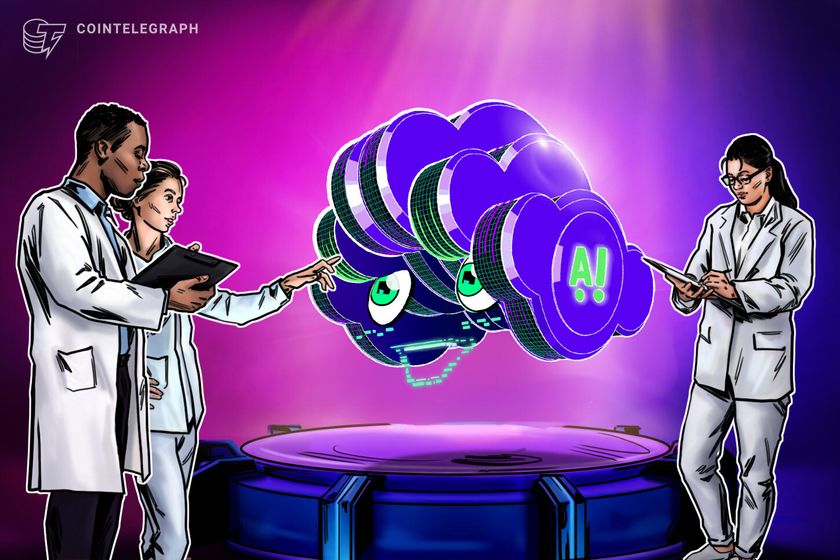
Microsoft and OpenAI face similar scrutiny as Europe and the UK seek to identify the line between investment and acquisition.
Amazon and artificial intelligence research firm Anthropic are being investigated as a de facto merger in the United Kingdom.
The UK’s Competition and Markets Authority (CMA) issued a formal notice on Aug. 8 announcing the inquiry’s commencement. According to documentation published on the UK government website, this marks the beginning of a “phase 1” investigation.
As Cointelegraph previously reported, UK authorities announced they were conducting preliminary investigations into partnerships between Amazon and Anthropic, Microsoft and Mistral AI, and Microsoft and OpenAI to determine whether any of the relationships had run afoul of EU regulations.

The company expressed worries that its detection system could somehow “stigmatize” the use of AI among non-English speakers.
OpenAI appears to be holding back a new “highly accurate” tool capable of detecting content generated by ChatGPT over concerns that it could be tampered with or cause non-English users to avoid generating text with artificial intelligence models.
The company mentioned it was working on various methods to detect content generated specifically by its products in a blog post back in May. On Aug. 4, the Wall Street Journal published an exclusive report indicating that plans to release the tools had stalled over internal debates concerning the ramifications of their release.
In the wake of the WSJ’s report, OpenAI updated its May blog post with new information concerning the detection tools. The long and short of it is that there’s still no timetable for release, despite the company’s admonition that at least one tool for determining text provenance is “highly accurate and even effective against localized tampering.”

The two companies face antitrust probes in the US and EU over their partnership.
Microsoft wants the feds to view its relationship with OpenAI as more of a frenemies (friends and enemies) situation than a real partnership, judging by a report filed with the SEC in July.
In the filing, a form 10-K periodic financial performance and conditions report, Microsoft declared OpenAI as its rival in several passages while also stating numerous times throughout the document that OpenAI was its “strategic partner.”
Interestingly, Microsoft cites dozens of rivals and “intense competition across all markets” in its statements on competition. These include companies ranging from Apple to Nintendo as well as several software and coding organizations.

This is the first time Google’s taken the top slot on the Chatbot Arena leaderboard.
There’s a new top dog in the world of generative artificial intelligence benchmarks and its name is Gemini 1.5 Pro.
The previous champ, OpenAI’s ChatGPT-4o, was finally surpassed on Aug. 1 when Google quietly launched an experimental release of its latest model.
Gemini’s latest update arrived without fanfare and is currently labelled as experimental. But it quickly gained the attention of the AI community across social media as reports began to trickle in that it was surpassing its rivals on benchmark scores.

Early previews of the tech were remarkable, but fears remain over its potential misuse.
After several delays reportedly related to safety and fine-tuning, OpenAI’s much anticipated “Advanced Voice Mode” (AVM) for ChatGPT is now available in alpha to select users.
The AVM feature was announced and demonstrated back in May. It allows users to have a real time conversation with the ChatGPT artificial intelligence model via a tech-to-speech synthesization module.
Those familiar with the concept may remember Google’s 2018 announcement that its “Duplex” AI service would be available “soon.” At its IO developer’s event, the company showed off an AI system capable of calling businesses on your behalf to schedule appointments in real time with humans.

AI is stretching the boundaries of existing internet protocols. A working group between DARPA, NIST and other federal agencies could help.
Some people claim that the United States federal government "invented the internet." While that‘s not quite true, many of the fundamental protocols that define the internet — HTTP, TCP/IP, SMTP, DNS, and others — were the product of deep collaboration between government and academic researchers. Part of their power lies in their openness, which facilitated broad interoperability and a level playing field for everyone from individuals to large corporations to communicate online. It’s also partly why no one made billions off the introduction of HTTP — the fact that no one owned these protocols is what made them such a powerful tool for global communication and commerce.
That leads us to the next "epoch-defining" technology: AI. Revolutionary though it is, generative AI comes to us via these same protocols. In part, that’s a testament to their scalability and forward-thinking design. Yet as AI capabilities advance, it seems likely to stretch the bounds of our existing internet protocols.
To fully harness the power of AI — and to maintain some semblance of order during a tumultuous technological revolution — we’ll need new protocols. And just like with the internet, the U.S. federal government, working in collaboration with academia and the private sector, is well-positioned to bring these into existence.
 A multi-year study sponsored by Openai’s Sam Altman examined the effects of a UBI stipend on the spending patterns of the beneficiaries, finding that most of the money was spent on basic needs. The study, which gave $45 million to thousands of Americans, also determined that the stipend increased the ability and willingness of recipients […]
A multi-year study sponsored by Openai’s Sam Altman examined the effects of a UBI stipend on the spending patterns of the beneficiaries, finding that most of the money was spent on basic needs. The study, which gave $45 million to thousands of Americans, also determined that the stipend increased the ability and willingness of recipients […]

The growing malaise for metaverse hype is reminiscent of the AI sector directly before the launch of GPT-3.
Matthew Ball, former global head of strategy at Amazon Studios and author of the 2022 book “The Metaverse: And How It Will Revolutionize Everything,” is re-releasing the book under a new, more underwhelming title: “Building the Spatial Internet.”
To be clear, the book will still be called “The Metaverse,” but the spatial internet bit will replace the former language indicating that the metaverse would revolutionize everything.
Evidently, after two years, the revolution has either come and gone or remains impending. Either way, on July 23, the book's newest edition launches.

The question is: which model best represents humanity?
Artificial intelligence is currently eating the world. Whether you believe it’ll lead to superintelligent machines, the end of humanity, or a bursting bubble, its impact can already be felt in industries around the globe.
It’s also spreading beyond our little blue and green planet. We’ve got AI in satellites, IBM’s Watson did a tour aboard the International Space Station, and NASA is currently working to integrate AI technologies into future spacecraft.
Soon, if a pair of scientists at the forefront of the search for alien life get their way, we’ll be sending chatbots like OpenAI’s ChatGPT to explain humanity and life on Earth to extraterrestrials.

The run on training hardware has put chipmakers at the forefront of the general artificial intelligence boom.
OpenAI is reportedly in talks with Broadcom and other chip makers in what appears to be an urgent effort to expand its artificial intelligence operations.
AI models such as OpenAI’s ChatGPT and Meta’s Llama are typically trained using massive clusters of graphical processing units (GPUs) or similar computer chips. The most popular hardware, the H100, belongs to Nvidia.
The H100 can cost anywhere from $15,000 to $30,000, depending on the number purchased and current market conditions. It can take tens of thousands of these AI chips to train a single model, with more necessary for larger, more robust systems.